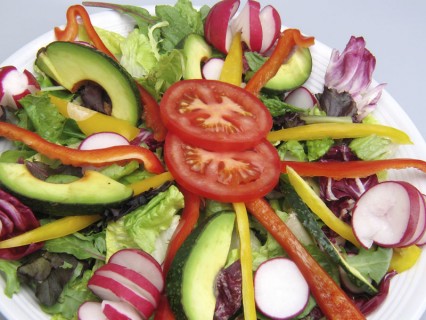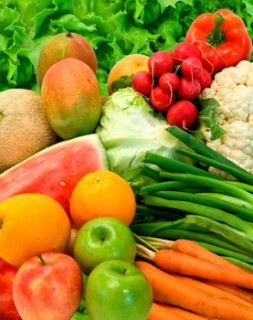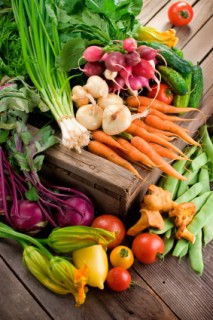Raw TRUTHS
1 Jan
Good health through natural and living foods
NUTRITION/WELLNESS consultant, raw food chef and instructor, Indian head and Thai foot massage expert, one-time dancer and jewellery designer… Jeni Cook has led an intriguing life and is the perfect person to offer some invaluable advice about how to lead a more healthy lifestyle.
(Published in H! Society Magazine, January 2008)
What encouraged you to personally begin a raw food diet?
At least once a year I like to give my body a detox by only drinking organic vegetable juices for seven days, but I often felt that going straight back to cooked foods seemed to undo all the feelings of well-being; in fact, I would immediately feel unwell. Introducing raw foods like salad and raw vegetables for the first week felt more natural to me. It was while I was at a detox retreat that I came across a book by a man named David Wolfe called Eating for Beauty. It talked about the health and anti-ageing benefits of eating a high raw diet and how lots of diseases and illnesses could be reversed or avoided. In my mind it seemed to make absolute sense, because what harm could eating foods in their natural state do to you?
As soon as I got home I immediately did some more research, ordered more books and really liked what I was finding out. I knew that this was something I had to try for myself and went 100 per cent raw for the next 30 days to see how it would affect my health. I was my own human guinea pig! I must admit, it was difficult at first, but after about a week I started to feel better. The first thing I noticed was that my energy increased.
What then prompted you to start teaching other people about its benefits?
It was something I didn’t want to keep to myself. I wanted to share it with as many people as possible because I felt they at least had the right to know so that they could make an informed choice for themselves and maybe make a positive difference in their lives. After experimenting for myself I went and got some professional training.
On your website, you say you have been a “health and fitness fanatic” since 17 but you also note that you suffered from a catalogue of health-related problems, which you attribute to the contraceptive pill…
I don’t attribute all my health problems to taking the contraceptive pill alone, but I do believe it was the start of my problems. Before the pill I never had a single problem, except for the odd cold now and then. As a teenager I was already going through hormonal changes but I think taking the contraceptive pill just upset the balance hormonally and chemically. I began suffering with repeated yeast infections, which is one of the known side-affect of the contraceptive pill. I also suffered migraines, aching joints, and mild depression occasionally.
I was always prescribed antibiotics for the yeast infections and I believe that actually made things worse. My immune system was actually being suppressed and the yeast infections became more resistant. It wreaked havoc in my body.
Is it possible your intensive health and fitness regime also had something to do with this? Can people go over the top with health, fitness and diet, and actually do more harm than good? If so, how can they avoid that?
I believe the combination of having a suppressed immune system, and having an intense health and fitness regime did contribute somewhat to my health problems, but you have to remember, I was much younger then and didn’t know as much as I do now. In the ‘80s Jane Fonda and ‘going for the burn’ was all the rage; what we didn’t realise then was that those kinds of regimes of over exertion created more acid in the body which we now know has a negative effect.
Now yoga and Pilates, with more stretching and deep breathing, is known to be less stressful and far more beneficial because they oxygenate and alkalise the body. Everything is about balance and not taking things to the extreme. We also need to learn to get in tune with our bodies and listen to what they are trying to tell us. I think we’ve kind of lost that ability a bit because we’re so far removed from nature and how we should integrate with it. Everything’s about fast food, fast cars, fast lifestyles. That’s not how things in nature work. Moderation is the key.
You talk about “living food”… What exactly does that mean?
Living foods are sprouted seeds, nuts and pulses which are the beginnings of a plant and loaded with minerals, vitamins, trace elements, enzymes and anti-oxidant properties. They are full of life-force energy and are 30 times more nutritious than the best vegetables, and one cup has more protein than the daily requirement. They also have the eight essential amino acids that we can’t make ourselves. I call them ‘Living Foods for Living People’.
You also talk about “holistic living”… Can you explain what that means?
For me holistic living means not just concentrating on what you eat or put into your body but also what kind of skincare products, cleaning products, and healthcare products you use. There are a lot of toxic chemicals in most of the everyday products that we use that can have a detrimental effect on our health, so I try to use things that are as organic, natural and chemical-free as possible, whenever possible. There’s always room for improvement though.
With people thinking more about healthy eating, losing weight and even de-toxing after Christmas-New Year excesses, in what ways can a raw food diet help them?
Just by starting your day with a green smoothie for breakfast or having a raw salad with your lunch and dinner you’ve already increased the amount of raw food in your diet and that can only be a good thing because these types of foods are loaded with nutrients and are naturally cleansing and healing. Energy will increase and excess weight will naturally and rapidly start to melt away along with being more active. I call raw foods ‘God’s own medicine’.
Some people obviously have misgivings about a predominantly raw food diet – and especially if it is vegan… How can you reassure them that they are obtaining all the nutrition they need?
People in general are going to be nervous about any changes they make. A friend of mine, Matt Amsden, a well known raw food chef in L.A., said it was easier to get someone to change their religion than it was to get them to change their diet because eating is something we do at least three times a day.
What always amuses me is that most people on the standard diet aren’t remotely concerned about the exact amount of nutrients in their food; all they care about is whether it tastes good and if it satisfies their immediate needs. The moment you ask them to think about what they put into their mouths or change it in any way, it makes them nervous and suddenly they become concerned. I think their concern is more to do with not feeling satisfied rather than not getting enough nutrients.
When we eat heavily cooked or processed foods the chemical message has been altered so our body has to work harder to unlock the codes in order to get the nutrients, but when we eat foods in their natural un-altered state, our body immediately recognises how to absorb and assimilate all the nutrients that it needs. All the vitamins, minerals and enzymes in raw food are still intact so are readily available to the body − so variety is essential.
Do you recommend, or approve of, non-vegetarian ingredients in your raw food diets – for example, sushi, beef carpaccio, steak tartar?
It’s not something I’d necessarily recommend because I know that raw meat and fish contains lots of parasites and aomaeba’s, not to mention the hormones, antibiotics, bovines and fungicides that they’re pumped with if they aren’t organic, but I do know that there are raw foodists that eat raw meat. Sashimi, which is raw fish, was one of my favourite foods before I went raw and I’m still tempted to indulge once in a while if I eat out. Even though I know it’s not ideal, it’s a choice I’ve made for myself and I try not to be dogmatic about it. I’m not the food police and being raw is not a religion.
Do you normally recommend a purely 100 per cent raw food diet, or that people still include some cooked food in their diet? If the latter, what proportions are the most advisable?
I think it’s more about finding what works best for you and adjusting as you go along. One size doesn’t fit all. When I first went raw I was 100 per cent because that’s what I needed to do and ideally that’s what really works best for me, but I’m not 100 per cent raw 100 per cent of the time because cooked food is addictive and I spent most of my life eating it so I find that I can’t always stick to being 100 per cent raw and I don’t want it to become an obsession for me. It’s more about balance and feeling healthy. In the summer I find it easier to be 100 per cent raw but come the winter, as hard as I try, I sometimes crave a little cooked food, so being 80 per cent raw works better for me, especially when I eat out or go to friends for dinner.
Some people starting out will want to go 100 per cent raw immediately and of course they will get dramatic results, but for others it feels easier to transition and start at 50 per cent raw and they are still going to see and feel the benefits and that might be more doable for them and less threatening. It’s not necessary to eat all your food raw. What’s more important is that people increase the amount of raw food in their diets whether it’s 50, 80 or 100 per cent.
Do you ever get cravings for less-than-healthy food?
Is the Pope a Catholic! I’m a wheat and sugar addict so I have to steer clear of those things. What’s great about being raw is that I can create foods that satisfy my cravings − raw crackers, cakes, bread and raw chocolate, even raw pizza − and the great thing is they aren’t bad for me and they really satisfy my cravings, which become less and less the longer I stay raw.
Can those who adopt a raw food diet still drink alcohol, in moderation obviously? And enjoy rich desserts?
Certain organic wines and champagne are technically raw, but alcohol is alcohol and it does destroy brain cells so I’d say it’s an individual choice. I’m partial to a glass of bubbly occasionally but I don’t make a habit of it. My view is that if you’re conscious about living a healthy lifestyle 99.9 per cent of the time it’s okay to indulge once in a while. In my experience, that one per cent of the time when I do indulge, I generally can’t wait to get back on track because I feel so much better.
What sort of people do you find taking up raw food diets? Are they mostly people who already have a fairly healthy diet and are moving to a new level? Or also many people making a radical change to their lifestyle?
In my experience I find they go across the board. I have clients that have had long-term health issues and have nowhere else to go or that don’t want to go down the allopathic route, people that just want to lose weight, people that already have a healthy lifestyle but want to go one step further, and people that are just curious. Whatever their reasons, they have always given positive feedback.
If the latter, should they be doing it gradually?
It all depends what you’re individual history is. There are some in the raw food world that say you should go 100 per cent raw immediately, but I’m not sure that I agree with that for everyone. The effects of raw food are very powerful and the cleansing effect may be too much for some to handle, so making a transition might be the more sensible way to go.
You are also a great advocate of liquid diets… In what way is this good for people?
I’m an advocate of juice fasting, not liquid diets, and the reason being that juice fasting allows the body to use all its energy to completely ‘clean house’ and give your digestive system a rest because raw fruit and vegetable juices contain all the nutrients the body needs without the fibre so they are easily assimilated. It also allows old built-up toxins to be rapidly removed from the body, and by combining it with enemas or colonics it really helps to completely remove the old built up plaque that might otherwise back up into your bloodstream and leave you feeling worse.
The results of a detox are clearer skin and eyes, increased energy, relief from constipation, mental clarity, weight loss, and a clearing up of minor ailments. We think nothing of taking our cars in for a service once a year, so why not your body? Unlike a car you can’t trade it in for a new one!
What services do you offer clients?
I offer clients food preparation classes, nutrition and wellness advice, one-to-one coaching, personal chef services for individuals, families and small dinner parties, 30-day raw food transition programmes, and weekend raw food and yoga retreats which begin in the spring.
You are multi-qualified and talented in many areas… Any new goals for the future?
What I’m doing now is what I really love to do and for now I just want to continue sharing it, spreading the word and trying to make a difference in people’s lives.
You and your husband (Sex Pistols drummer Paul Cook) have a second home in Marbella… How often do you manage to visit here?
We love Spain and its great weather and beautiful landscape and that’s the reason we came, and we try to come three to four times a year.
Is it difficult for people to maintain a healthy lifestyle in such a hedonist, party-going resort as Marbella (or the Costa del Sol in general)? Or does the climate and abundance of sports amenities actually provide a good environment for those who want to stay (or get) healthy?
People come here for different reasons and I’m well aware of the party-going scene but it’s not the lifestyle that I’m drawn to so it’s not difficult for me to stay healthy; in fact I find that the climate, amenities and good environment make it more conducive to my healthy lifestyle than living in London.
For more information about Jeni Cook and raw food: jeni@rawhealthharmony.co.uk




No comments yet